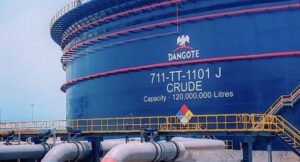

Dangote refinery denies receiving 29m barrels of crude oil allocation
By Esther Agbo
In response to a recent statement by the Nigerian Upstream Petroleum Regulatory Commission (NUPRC), the Dangote Petroleum Refinery and Petrochemicals has clarified that ita yet to receive the 29 million barrels of crude oil allocated to it.
The allocation, which NUPRC claimed to have facilitated, was announced as part of efforts to support domestic refining under the Petroleum Industry Act (PIA).
In a press statement, the Group Chief, Branding and Communications Officer for Dangote Group, Anthony Chiejina, expressed gratitude for the allocation but emphasized that, contrary to NUPRC’s announcement, the refinery is still awaiting the delivery of the crude cargoes.
“We will like to thank them for this allocation but at the same time, let them know that we are yet to receive this cargoes.
“Aside from the term supply, we bilaterally negotiated with NNPC, so far NUPRC has only facilitated the purchase of one crude cargo from a domestic producer,” Chiejina stated.
The statement further revealed that the majority of crude oil processed by the refinery has been sourced from international traders, rather than domestic producers.
Dangote Group raised concerns over this situation, urging that Nigerian refineries should be allowed to purchase crude directly from local producers, as mandated by the PIA, rather than relying on international intermediaries.
“All we are asking for, is for refineries in Nigeria to buy crude directly from the companies that produce it in Nigeria, rather than from international middlemen. This is special in the PIA,” the statement continued.
Chiejina criticized NUPRC’s handling of the domestic crude supply obligation, pointing out that the commission, in its recent statement, admitted it might be unable to enforce this provision of the PIA due to concerns over the “sanctity of contracts.”
The Dangote Refinery, which is one of the largest in Africa, has been at the forefront of Nigeria’s push to reduce reliance on imported petroleum products.
The inability to secure consistent crude oil supplies domestically raises questions about the effectiveness of the PIA and the government’s commitment to supporting local refining capacity.



